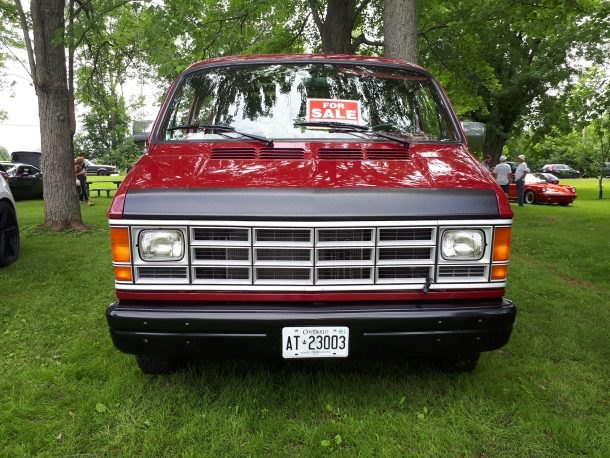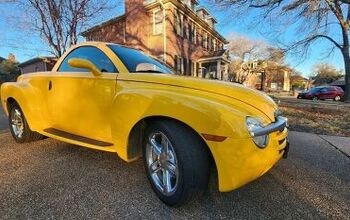QOTD: Is This Something We Should… Aspire To?

There was an odd bit of PR posted to Ford’s media site this week — something that’s not altogether surprising, given the current socio-economic climate. You know about vans, right? Thought so. While the Econoline van is gone and the Windstar/Freestar a distant memory, Ford still has two boxes on wheels ready for the taking.
How’d you like to live in one?
Ford’s story concerns women who live in their vans — in most cases, as a temporary hotel room while on the road, but in another case as a full-time thing. Yes, that Transit or Transit Connect can be your log cabin in the woods if you so choose. Just be ready with that thermal foil and drill, but be aware that modifications might void your warranty.
The message seems to be that empowerment, freedom, and rent-free (but not necessarily payment-free) living awaits. Of this, we have no doubt. Who doesn’t want to go camping with a large van? If you’re like me, and have a fear of tents — land sharks (bears) lurk everywhere, you know — then the cargo floor of a spacious commercial van seems like a pretty nice place to spend the night. On holiday? Think of the money you could save by choosing the Walmart parking lot over a suite overlooking the ocean. Hell, you might make friends with the owners of the RVs parked there.
But to live in a Transit Connect? To spend your life seeking safe spots to park at night while showering at the YWCA in the morning? (“You get used to picking the right spots, and you just rely on common sense,” says van dweller Tasha Rivard). Is that really the life we should aspire to, or even promote? Sure, if you’re the artsy, creative, connected type who wants to go where the wind takes you while a string of paying clients remains just an email away, have at it. If a city or job beckons you to put down roots, the rental listings await. Far be it for me to tell a woman (or man) what to do.
I’m just not sure if an automaker can expect much of a draw from this would-be customer base. Certainly, if you’re living the stereotypical nomad life, that van probably left its warranty coverage behind during the Clinton administration. It’ll be held together with chewing gum and paper clips.
This type of is a little more extreme than the vanning craze that spawned the vehicles you see here. It was expected that the cool guys driving these rigs owned or rented some sort of residence when they weren’t relaxing at the beach or drinking Miller and seeking out unwanted pregnancies outside the KISS concert.
So, tell me, B&B — am I overthinking this? Should automakers be allowed to promote their vehicles as rolling abodes free of guilt? And: have you ever felt the urge to live the van life yourself?
[Images: Steph Willems/TTAC, Ford Motor Company]

More by Steph Willems
Latest Car Reviews
Read moreLatest Product Reviews
Read moreRecent Comments
- Probert They already have hybrids, but these won't ever be them as they are built on the modular E-GMP skateboard.
- Justin You guys still looking for that sportbak? I just saw one on the Facebook marketplace in Arizona
- 28-Cars-Later I cannot remember what happens now, but there are whiteblocks in this period which develop a "tick" like sound which indicates they are toast (maybe head gasket?). Ten or so years ago I looked at an '03 or '04 S60 (I forget why) and I brought my Volvo indy along to tell me if it was worth my time - it ticked and that's when I learned this. This XC90 is probably worth about $300 as it sits, not kidding, and it will cost you conservatively $2500 for an engine swap (all the ones I see on car-part.com have north of 130K miles starting at $1,100 and that's not including freight to a shop, shop labor, other internals to do such as timing belt while engine out etc).
- 28-Cars-Later Ford reported it lost $132,000 for each of its 10,000 electric vehicles sold in the first quarter of 2024, according to CNN. The sales were down 20 percent from the first quarter of 2023 and would “drag down earnings for the company overall.”The losses include “hundreds of millions being spent on research and development of the next generation of EVs for Ford. Those investments are years away from paying off.” [if they ever are recouped] Ford is the only major carmaker breaking out EV numbers by themselves. But other marques likely suffer similar losses. https://www.zerohedge.com/political/fords-120000-loss-vehicle-shows-california-ev-goals-are-impossible Given these facts, how did Tesla ever produce anything in volume let alone profit?
- AZFelix Let's forego all of this dilly-dallying with autonomous cars and cut right to the chase and the only real solution.






































Comments
Join the conversation
Ford is actually advocating an illegal act. It's not lawful to be homeless, or a full-time RV'er, especially if you have funds to pay the fines. If you're homeless, live on dirt and broke, no one cares enforce US laws on you. Paying your rent/mortgage/utilities and otherwise "keeping a home" even if that's most of your bring-home pay, helps keep the US afloat and the wheels turning. It's also illegal to be "off grid". In fact, I don't know of any US state that establishes driver's licenses or IDs without 2 month's utility bills in your name.
I lived in what was later called a "Mini-van" for about 6 months almost 50 years ago. I was "between jobs" and did not have enough money from previous employment to pay first/last/deposit on an apartment. You learn how to do things differently in that situation. Of course this was long before the term "molester van" or the sticker "Don't Laugh, Your Daughter Might Be Inside". It was a lot easier to find a place to park for the night then. Less competition and fewer security guards. Years later when I got a van with built in camping stuff, beds, cabinets, water tank, sink, etc, it was easier to go on trips of up to two weeks. You learn where you can find showers for free or cheap (often in State Parks) and other tricks of the road. I don't think I'll have to do that again, but if necessary I know I can.